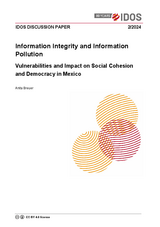Information integrity and information pollution: vulnerabilities and impact on social cohesion and democracy in Mexico
Breuer, AnitaDiscussion Paper (2/2024)
Bonn: German Institute of Development and Sustainability (IDOS)
ISBN: 978-3-96021-226-3
DOI: https://doi.org/10.23661/idp2.2024
Price: 6 €
Equal access to reliable information is essential for democracy and social cohesion. The rise of information pollution, particularly in digital spaces, poses significant challenges to democratic societies worldwide. While extensive research has focused on its impact in developed, English-speaking democracies, there is a gap in understanding its effects in younger democracies, conflict zones, and less developed contexts. This study fills that gap by analysing Mexico as a case study. Based on interviews with Mexican media professionals, public sector officials, academics and human rights defenders, the study provides insights on the root causes of the problem and and strategies to combat information pollution, safeguard democracy, and promote social cohesion, underscoring the urgency of proactive measures both within Mexico and on a global scale in Mexico, information pollution significantly threatens the country's social cohesion and democratic principles. Structural conditions like poverty, inequality, violence, corruption, and media landscape issues enable societal vulnerability to digital information pollution. Factors directly driving information pollution include the exploitation of digital spaces by drug cartels, divisive narratives against marginalised groups, an increasingly media-hostile environment as well as the incumbent government’s post-factual approach to reality and politics. Information pollution has fostered a polarised discours, contributed to eroding trust in traditional media and amplified identity-based societal cleavages. It weakens the deliberative, participatory and liberal dimensions of democracy dimensions by decreasing the quality of public debate, damaging civil society watchdog roles, and reducing government transparency and accountability. Recommendations for Mexico encompass enhancing public resilience to information through civic education and targeted communication campaigns, empowering media capacity, and fortifying an open data culture in the Mexican public sector. Internationally, efforts should address elite-driven information pollution by reinforcing independent accountability institutions and leveraging diplomatic and economic incentives against leaders attacking these institutions.


